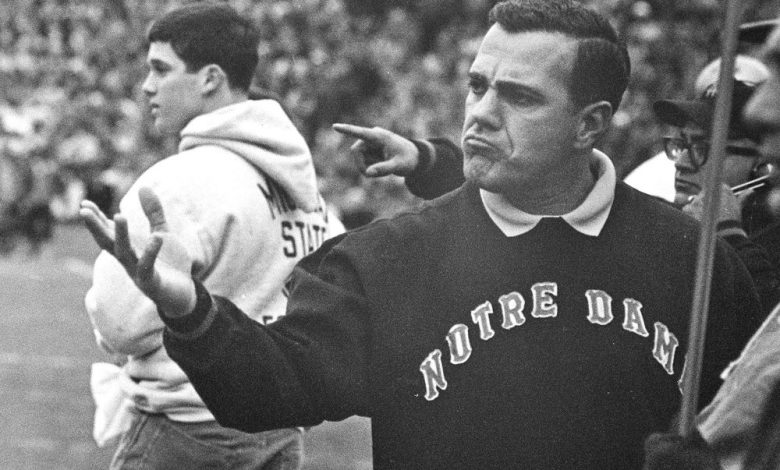Notre Dame Closes Ara Parseghian-Named Lab at Center of Controversy, Legal Dispute Raises Questions About Donor Intent and Institutional Oversight

A research lab named in honor of legendary Notre Dame football coach Ara Parseghian has been abruptly shut down amid an ongoing lawsuit, sparking concerns over donor intent, institutional transparency, and the future of medical research tied to the university.
The lab, housed at Notre Dame’s Center for Rare and Neglected Diseases (CRND), was founded to honor the memory of Parseghian and his commitment to rare disease advocacy, particularly Niemann-Pick Type C — the disease that claimed the lives of three of his grandchildren. For years, the Ara Parseghian Medical Research Fund (APMRF) supported groundbreaking work at Notre Dame and was regarded as a symbol of the university’s intersection between legacy, philanthropy, and life-saving innovation.
But now, that legacy is under scrutiny.
The Lawsuit That Shook the Foundation
Earlier this year, the Parseghian family filed a civil lawsuit against the University of Notre Dame, alleging that the school mismanaged donations meant for rare disease research and violated terms of the original agreement associated with the lab’s naming and operations. The complaint, filed in St. Joseph County, argues that the university reallocated resources from the Parseghian lab without appropriate consultation and failed to honor commitments made to donors.
According to legal documents, the family claims Notre Dame diverted funds meant explicitly for Niemann-Pick Type C research toward unrelated initiatives. The family also accuses the university of closing or downsizing parts of the center without warning, undermining years of advocacy and donor outreach.
“The Parseghian name stands for integrity, passion, and a relentless fight against devastating diseases,” said Michael Parseghian, son of the late coach and co-founder of the APMRF. “We were assured that Notre Dame would uphold those values — not just as a gesture, but as a contractual and ethical obligation.”
Notre Dame, for its part, has issued a limited public response but maintains that the university has acted within its rights and remains committed to rare disease research.
Impact on the Research Community
The lab’s closure has sent shockwaves through the rare disease research community. For over a decade, the Ara Parseghian lab had been a hub for collaborative projects involving scientists, physicians, and advocacy groups from across the country. Its closure may slow momentum on key research projects, especially those in later stages of development.
“This is devastating,” said Dr. Elizabeth Hines, a rare disease specialist at Johns Hopkins who collaborated with the CRND. “Notre Dame was one of the few academic institutions putting sustained energy behind this type of work. The loss of this lab is a step backward.”
The timing is particularly sensitive, as the lab had recently made strides in identifying potential therapeutic pathways for Niemann-Pick Type C and other neurodegenerative disorders. With its closure, grant opportunities, shared data pipelines, and research continuity are all in jeopardy.
Donor Trust in Question
At the heart of the legal dispute is the question of donor trust — and whether Notre Dame’s internal decisions aligned with the expectations set during fundraising campaigns.
The Parseghian family asserts that thousands of donors were led to believe their contributions would directly support the lab and its rare disease mission. Redirecting funds, they argue, undermines that relationship.
“The issue isn’t just about a building or a lab,” said Nancy Powers, a longtime donor to the APMRF. “It’s about trust. We gave with the understanding that our money would fight these terrible diseases in the name of a man who gave everything to Notre Dame and this cause.”
The lawsuit includes multiple exhibits of past communications, donor agreements, and university press releases which the family says establish Notre Dame’s commitment to permanent research efforts under the Parseghian banner.
The Legacy of Ara Parseghian
Ara Parseghian, who passed away in 2017, is remembered not only for his 95–17–4 record as head coach at Notre Dame (1964–1974) and a national title in 1966, but also for his humanitarian efforts in the years following his coaching career.
Following the diagnosis of his grandchildren with Niemann-Pick Type C, Parseghian committed himself to raising awareness and funds for research. In partnership with Notre Dame and the broader scientific community, he helped raise over $45 million toward understanding and combating the disease.
“He wanted to win on the field and in the lab,” said former Notre Dame athletic director Jack Swarbrick. “What he brought to that mission — grit, discipline, passion — was exactly what you’d expect from a legendary coach.”
That legacy was supposed to be cemented in the form of the lab and its continued work.
Legal and Institutional Ramifications
While the university has remained mostly quiet in public statements, legal experts say the case could have broader implications for how academic institutions manage restricted funds and honor named gifts.
“If it’s proven that Notre Dame diverted funds in a way that violates the donor agreement, this could be precedent-setting,” said Leah Foster, a legal scholar in philanthropy law at Northwestern University. “Universities thrive on the goodwill of donors. Breaching that trust can have long-term consequences not only financially, but reputationally.”
Notre Dame is expected to file a formal response to the lawsuit within the next several weeks. The school has stated that it “respects the legacy of Coach Parseghian” and is “evaluating future initiatives related to rare disease research.” However, no clear plans for replacing or restoring the lab have been announced.
Student and Alumni Reaction
The situation has prompted outrage from parts of the Notre Dame alumni network. Student organizations and alumni groups dedicated to medical advocacy have started circulating petitions and open letters urging the administration to reconcile with the Parseghian family.
“I chose Notre Dame because it stood for something bigger,” said Grace McLellan, a pre-med junior involved in rare disease research. “This lab wasn’t just a research space — it was a symbol. And symbols matter.”
Others have noted the irony of a university that frequently touts its commitment to ethical leadership and Catholic values finding itself in a public dispute with the family of one of its greatest icons.
What Comes Next?
Whether the lawsuit leads to a formal restoration of the lab or financial restitution remains to be seen. For now, the Parseghian family is pressing forward with its legal strategy and advocacy efforts, ensuring that the story remains in the spotlight.
“We didn’t want this fight,” Michael Parseghian said. “But we owe it to Dad — and to every family battling rare disease — to see it through.”
The fallout from the lab’s closure and the ongoing litigation may continue to affect Notre Dame’s standing in both the academic and athletic communities. For many, this is about more than a single lawsuit. It’s about whether the university can be counted on to do what’s right — even when no one’s watching.
As the case unfolds, all eyes will be on South Bend. Not just from fans of football or science, but from those who believe that honoring legacies means keeping promises — especially the ones made in a time of hope.









